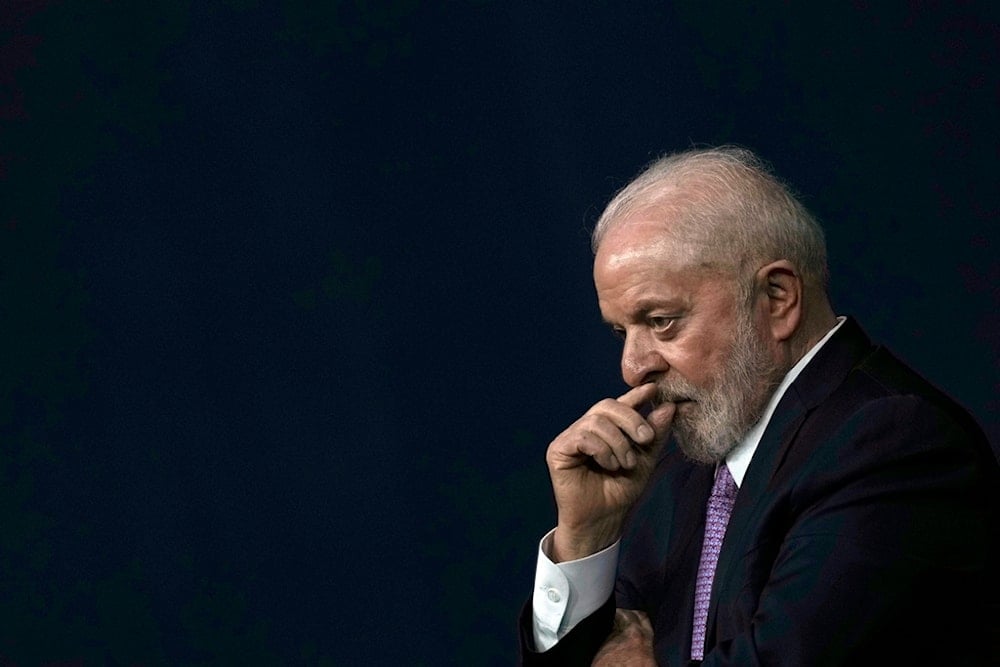Lula pledges a win in the environmental war against illegal miners
After thousands of illegal miners resisted expulsion from the Amazonian indigenous lands, Brazilian President Luiz Inácio Lula da Silva affirmed that the "war against environmental criminals" must persist to protect the land.
-

Brazil's President Luiz Inacio Lula da Silva attends the swearing-in ceremony of the new Attorney General Paulo Gustavo Gonet Branco in Brasilia, Brazil, Monday, Dec. 18, 2023. (AP)
After thousands of illegal miners resisted expulsion from the Amazonian indigenous lands, Brazilian President Luiz Inácio Lula da Silva affirmed that the "war against environmental criminals" must persist to protect the land.
When Lula da Silva took office last January, he vowed that an estimated 20,000 gold and tin prospectors would be expelled from the Yanomami indigenous lands in the Amazon following four years of environmental devastation, passively permitted under former President Jair Bolsonaro's government.
Special environmental and federal forces were tasked with scouting the lands for eco-criminals, resulting in historic successes until the operations' magnitude gradually diminished, prompting the continuance of ecological corruption. Yanomami veteran leader Davi Kopenawa stressed the need for a re-escalation of operations that would halt all activities that led to the destruction of the Yanomami mountains and their ecology.
Other indigenous leaders have also echoed Kopenawa's call, saying governmental supervision following the litigation of certain laws was needed to avoid any breaches. For example, although an anti-flight law was passed over indigenous lands, illegal aircraft still hover over them, impacting nature.
Read more: The battle to save Yanomami's Amazon territory turns deadly
Lula: Quick and Efficient
Hearing their call, Lula gathered more than a dozen top ministers and military and federal leaders for updates on the status of the Yanomami missions, as illegal miners have been accused of having direct ties in the increased child mortality rate due to malaria, emphasizing a national ordeal.
“This meeting is about deciding – once and for all – what our government’s going to do to make sure Indigenous Brazilians no longer fall victim to massacres, hooliganism, mining, and to people who want to invade preserved areas that belong to the Indigenous people and cannot be used [by outsiders],” Lula said, urging for full-force governmental action.
Lula also declared it a war against environmental criminals who consistently break the law, pledging that it will not be lost.
The president took to X in a vow to reinstate routine missions in "new, even more serious actions against invaders, with the participation of several ministries involved," against illegal environmental corrupters.
Hoje estamos fazendo uma reunião de balanço sobre a situação dos indígenas Yanomami e o que vamos fazer permanentemente para vencer essa guerra contra o garimpo ilegal, o vandalismo, contra os agressores do meio ambiente e o crime organizado. Estamos preparando novas ações ainda… pic.twitter.com/dRHWo56O1b
— Lula (@LulaOficial) January 9, 2024
Brazil's prioritization of the environment
It is worth noting that President Lula da Silva has been a major champion for environmental preservation and protection.
Just last week, Brazil’s National Space Agency announced that deforestation has fallen by 50% in 2023, compared to the year before under Bolsonaro's government which implemented a series of reforms to sideline important agencies like Brazil's environmental protection agency IBAMA, and also suspended the Amazon Fund in November 2019 following a quarrel with Norway.
Lula da Silva came into the country's presidential race with numerous environmental and social pledges, chief among which was reducing the deforestation in the Amazon rainforest, which was for years taken through the wringer by his far-right predecessor, and that, he did.
From January to June, the rainforest had alerts covering 2,650 sq km, down from 4,000 sq km during the same period last year under Bolsonaro.
This year includes a 41% drop in alerts for June, which usually kicks off the dry season, a time when deforestation tends to jump.
"The effort of reversing the curve of growth has been reached. That is a fact: we reversed the curve; deforestation isn’t increasing," the environment ministry's executive secretary, Joao Paulo Capobianco, said in Brasilia.

 4 Min Read
4 Min Read








